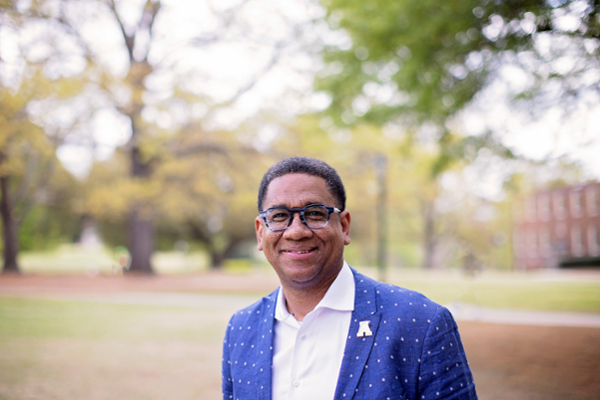
This article was originally published in the 2022 issue of the Beeson magazine.
Beeson alumnus Tyshawn Gardner (M.Div. ’14) has served as pastor of Plum Grove Baptist Church in Tuscaloosa, Alabama, for 19 years and has recently been named associate professor of Biblical and Religious Studies and director of the Preministerial Scholars program at Samford University. He is also the author of two forthcoming books, Sacred Anthropology: Prophetic Radicalism for Pulpit and Pew (Fortress Press, September 2022) and Social Crisis Preaching: Biblical Proclamation for Pulpit and Pew (B&H, 2023). Gardner earned his Ph.D. in Christian Preaching from The Southern Baptist Theological Seminary in Louisville, Kentucky.
KP: What role do hymns play in the African American tradition, specifically as it relates to preaching?
TG: In the African American Church tradition, hymns are partners with preaching in the spiritual formation of the local body of Christ. Hymns set the emotional and spiritual tone for preaching. Hymns have also aided preachers in mining hope from the mountains of despair faced by a people beset by social, political and economic disenfranchisement. In the African American Church, traditionally, hymns have been inseparable from the preaching experience, joining church members and ministers in the empowering experience of worship.
KP: What significant role did hymns and spirituals play during the Civil Rights Movement in the 1960s?
TG: Hymns reminded those fighting for civil rights that their cause was anchored in a freedom-giving and justice-loving God, even though the wait for justice and equality seemed long. Hymns had a way of sowing hope in the soul of the lay hymnologist. Long after the preaching moment was concluded, hymns stirred hope in hearts of the people as they sang in kitchens, jails, factories, fields and as they marched in the streets. Hymns like, “We Shall Overcome,” became the theme song of the movement.
KP: How can preachers incorporate hymnology into their preaching today?
TG: Preachers can insert a line of a hymn into the sermon for an effective and positive response. A sermon about the grace of God in salvationcan include a line from “Amazing Grace.” Perfectly placed, the insertion of a hymn in the sermon can illuminate a sacred biblical truth. African American preachers have sung hymns before, during and/or after the sermon. Preachers can follow that practice today. Moreover, preachers can ask the musicians and the believers in the pews to join in singing hymns before or after the preaching moment.
KP: What are some of the most important African American hymns and spirituals and why? What do they have to teach us?
TG: Hymns like, “Shine on Me” and “Pass Me Not,” were sung to remind the believer that God does not forget those who are in despair. “Father, I Stretch My Hand to Thee” and “Amazing Grace,” a notable hymn in most any Christian tradition, bear a soulful and emotional distinction in the African American Church that is born from the testimony of a people who believe the Bible’s testimony about God and Jesus Christ. The most impactful hymns in the African American Church are those hymns that communicate the unique cultural experience of African Americansand that are sung in the pathos and spiritual fervency of a hopeful people who believed that God is faithful to the down trodden and oppressed. Spirituals like, “Oh, Freedom,” with the lyrics: “oh freedom,freedom over me, before I’ll be a slave, I’ll be buried in my grave and go home to my Lord and be free,” communicated correctly that God’s ultimate will is freedom and liberation and that slavery was not the intention of God, but rather the result of a fallen world. Other spirituals like, “Wade in the Water,” contained hidden messages for slaves and communicated God’s aid in the plans of escape from slavery: “wade in the water children, God’s gonna trouble the water.” “Ezekiel Saw the Wheel” is a spiritual that testified to the awesome power of God and the surety of his Word, while the spiritual “Steal Away to Jesus” and “Sometimes I Feel like a Motherless Child,” articulated the realities of the sufferings of this present world and faith in the joys of the world awaiting. Hymns and spirituals teach us of the faithfulness of God in human suffering and pain. Likewise, hymns and spirituals instruct us that melody in the heart of the believer is balm to the suffering soul that waits upon the sure promises of God.
KP: How have hymns shaped you and your preaching?
TG: I love hymns. They have kept me grounded amid the strong winds of pluralism and post modernity. They call me and my church back to the most important and essential truths in the Word of God.
